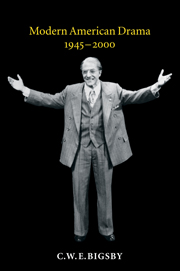Book contents
- Frontmatter
- Contents
- Preface to First Edition
- Preface to Second Edition
- 1 The absent voice: American drama and the critic
- 2 Eugene O'Neill's Endgame
- 3 Tennessee Williams: the theatricalising self
- 4 Arthur Miller: the moral imperative
- 5 Edward Albee: journey to apocalypse
- 6 A Broadway interlude
- 7 Sam Shepard: imagining America
- 8 David Mamet: all true stories
- 9 The performing self
- 10 Redefining the centre: politics, race, gender
- 11 Beyond Broadway
- Notes
- Index
4 - Arthur Miller: the moral imperative
Published online by Cambridge University Press: 10 December 2009
- Frontmatter
- Contents
- Preface to First Edition
- Preface to Second Edition
- 1 The absent voice: American drama and the critic
- 2 Eugene O'Neill's Endgame
- 3 Tennessee Williams: the theatricalising self
- 4 Arthur Miller: the moral imperative
- 5 Edward Albee: journey to apocalypse
- 6 A Broadway interlude
- 7 Sam Shepard: imagining America
- 8 David Mamet: all true stories
- 9 The performing self
- 10 Redefining the centre: politics, race, gender
- 11 Beyond Broadway
- Notes
- Index
Summary
Any account of post-war theatre in America must begin not with the war, which (besides the plays squirrelled away by an alienated O'Neill) produced virtually nothing of any note and was directly shared by only a fraction of the American people (and certainly by none of the major playwrights who were to dominate the next three decades), but with the Depression. It was an experience that shaped both Arthur Miller and Tennessee Williams who began to write not in the forties but in the thirties, the former creating a series of protest plays, the latter working with a radical theatre company. This pre-history formed many of their assumptions, defined their themes and explains something of the pressure exerted on their characters. Often plays apparently set at other times seem to bear the impress of the thirties, from All My Sons and Death of a Salesman through to The Price, from The Glass Menagerie and Orpheus Descending through to Sweet Bird of Youth. The loss of dignity and self-assurance which Miller saw as one legacy of the Crash clearly left its mark on Willy Loman as it did on Amanda Wingfield. The sense of promises turned to dust, of the individual suddenly severed from a world that had seemed secure, underlies much of their work. The shock which both writers express seems to derive from their sense of the fragility of the social world, the thinness of the membrane that separates us from chaos. That conviction was shaped by the events of a decade that began with economic debacle and ended with war in Europe.
- Type
- Chapter
- Information
- Modern American Drama, 1945–2000 , pp. 69 - 123Publisher: Cambridge University PressPrint publication year: 2000
- 1
- Cited by



